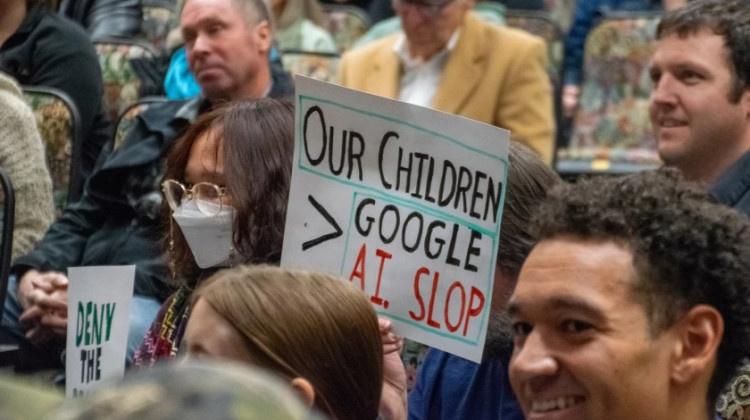
Indiana House Democrats walked out of the Statehouse and headed to Illinois in the middle of session, halting all legislative business for more than a month in 2011.
FILE PHOTO: WFIU/WTIUTen years ago, Indiana House Democrats walked out of the Statehouse and headed to Illinois in the middle of session, halting all legislative business for more than a month.
It was a legislative walkout that made national news and had an impact that’s still felt today.
Democrats had controlled the Indiana House for most of the first decade of the 2000s. But Republicans recaptured the majority ahead of the 2011 session, and with that came Right to Work – a controversial bill affecting labor union dues.
The measure drew ire from Democrats and brought thousands of protesters to the Statehouse. But Democratic lawmakers couldn’t stop the bill’s momentum – until on Feb. 22, 2011, they used a procedure other minority caucuses had employed before: a walkout. The House needs two-thirds of its members to conduct business, whether in committee or on the floor. By leaving the chamber, Democrats put a halt to everything.
Only this time, they didn’t just leave the floor. Then-House Minority Leader Pat Bauer (D-South Bend) and about three dozen members of his caucus left the state, heading to Illinois.
“We hope that this timeout gives some time for reflection of those who want to radicalize our state,” Bauer said.
Republican leaders, like then-Gov. Mitch Daniels, didn’t react kindly to Bauer’s move.
“He has embarrassed himself, his caucus and his party," Daniels said. "If he keeps it up, he’ll embarrass the entire state.”
READ MORE: How Do I Follow Indiana's Legislative Session? Here's Your Guide To Demystify The Process
Then-Speaker Brian Bosma (R-Indianapolis) addressed the House chamber and its gallery full of union supporters.
“We will not concede to a list of demands from those who have vacated this state," Bosma said as his caucus applauded and boos rained down from the balcony.
Right to Work wasn’t the only issue the two sides fought over. There were nearly a dozen bills – including creation of the state’s school voucher program – that kept Democrats encamped in Illinois for five weeks.
At times, it seemed like progress was being made. Bauer and Bosma would speak on the phone and met in person a couple times.
And then things would fall apart, like when Republicans started fining Democratic lawmakers, including then-Rep. Craig Fry (D-Mishawaka).
“So, if I have to be in Urbana, Illinois, until hell freezes over, that’s what it’s gonna be,” Fry said.
Democrats weren’t alone at the Comfort Suites just off I-74. Angela Mapes Turner was a reporter for the Fort Wayne Journal Gazette and got sent to Illinois a couple time during the walkout.
“Local people who had heard about it came in, either to support them or – I witnessed people who came in to yell at them, tell them to go home and go do your work,” Turner said.
Turner also remembers that Democrats in Illinois weren’t just sitting around.
“It fell into this really structured rhythm of, they would go into the Comfort Suites and caucus every day,” Turner said.
Rep. Jerry Torr (R-Carmel) remembers something different: what he calls the “public backlash” against the walkout that he said propelled Republicans to a supermajority in the following election – a supermajority they haven’t relinquished since.
Andrew Downs, Mike Downs Center for Indiana Politics at Purdue University-Fort Wayne director, said the walkout was part of what helped the GOP win a House supermajority – but it wasn’t the only reason.
“They would also throw on top of that that the redistricting that happened in 2011 flat out just made it a lot more difficult for people to win races,” Downs said.
Rep. Greg Porter (D-Indianapolis) said his caucus not using the walkout to fight for different legislative maps was a mistake. And while Democrats did get Right to Work taken off the table for the 2011 session, it became law the next year. Still, Porter doesn’t regret what the caucus did.
“When you believe in something, you work through it and you fight for it,” Porter said.
Torr sees another impact of the walkout.
“As long as we have members in both caucuses that remember 2011, no matter who’s in the minority, I don’t think anybody’s going to walk out for an extended period of time again,” Torr said.
Contact reporter Brandon at bsmith@ipbs.org or follow him on Twitter at @brandonjsmith5.
CORRECTION: A previous version of this story misidentified Rep. Greg Porter's political party as Republican. That is incorrect. He is a Democrat.
 DONATE
DONATE







 Support WFYI. We can't do it without you.
Support WFYI. We can't do it without you.